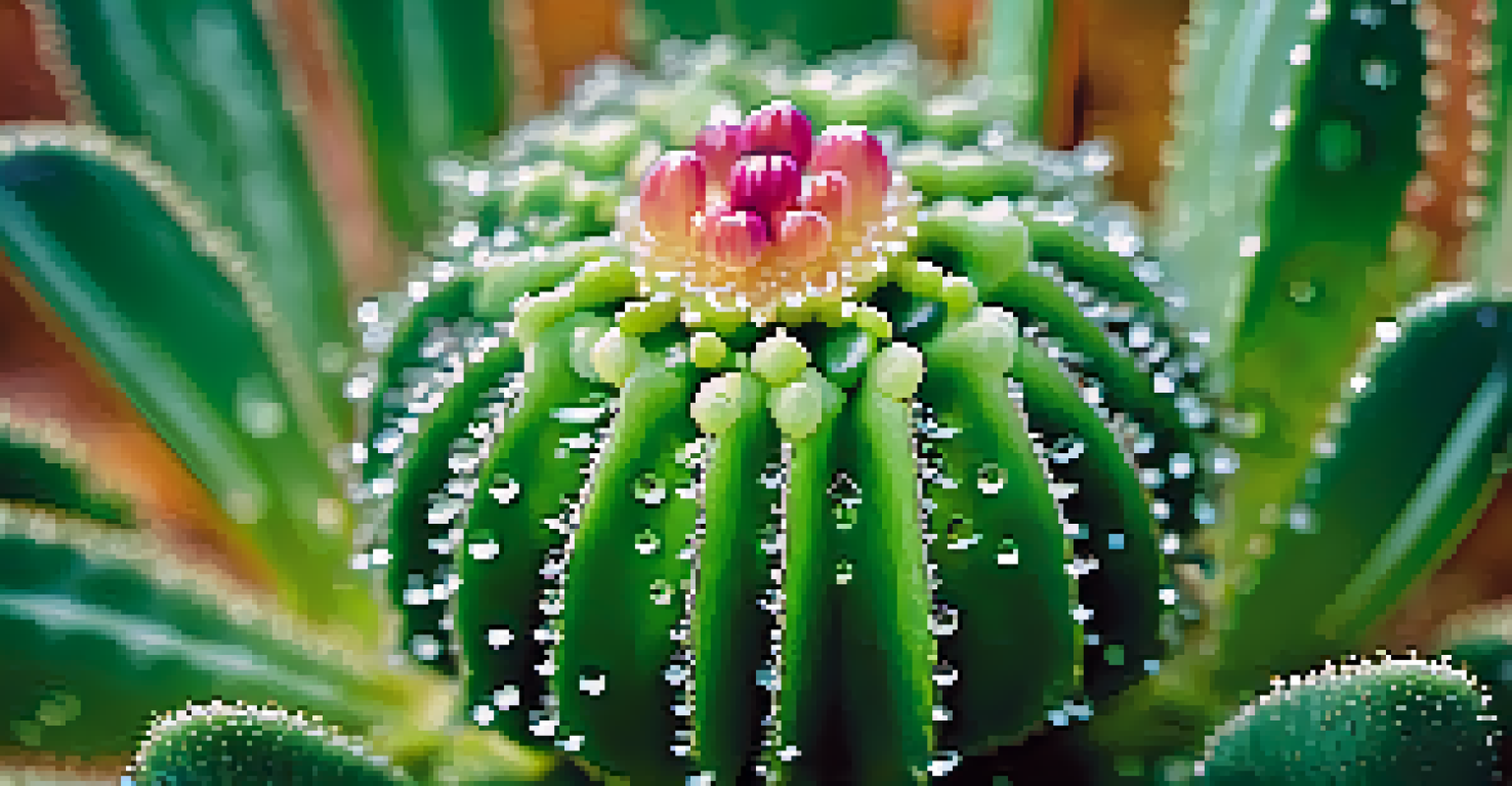The Impact of Peyote on Emotional Well-Being and Mental Health

Understanding Peyote and Its Historical Significance
Peyote, a small cactus native to Mexico and the southwestern United States, has been used for thousands of years in spiritual and medicinal contexts. Traditionally, Indigenous peoples have utilized peyote in religious ceremonies, believing it connects them to the divine. This historical significance underscores the importance of understanding its effects on emotional and mental health in a contemporary setting.
The experience of peyote can empower individuals to confront their emotions and foster personal growth.
The active compound in peyote, mescaline, is known for its psychoactive properties, leading to altered states of consciousness. These experiences can range from profound insights to deep emotional releases, making peyote a fascinating subject for those interested in mental health. However, it’s essential to approach these effects with respect and caution, given the cultural context.
As we delve into the emotional impacts of peyote, it’s crucial to consider both the positive and potential negative outcomes. While many users report enhanced emotional well-being and spiritual awareness, others may experience anxiety or disorientation. This duality highlights the need for further investigation into how peyote can be integrated safely into therapeutic practices.
Peyote and Emotional Resilience: A Therapeutic Perspective
Emerging research suggests that peyote may enhance emotional resilience, helping individuals cope better with stress and anxiety. Users often report feelings of interconnectedness and acceptance during their experiences, which can lead to improved emotional regulation. This resilience is particularly important in today's fast-paced world, where mental health challenges are increasingly common.

In therapeutic settings, peyote has been explored as a potential treatment for trauma and PTSD. Some studies indicate that the introspective nature of the peyote experience can facilitate emotional healing by allowing individuals to confront and process difficult emotions. This can lead to significant breakthroughs in understanding oneself and one’s emotional landscape.
Peyote's Historical Significance
Peyote has been used for thousands of years in Indigenous spiritual practices, highlighting its importance in understanding emotional and mental health today.
However, it’s important to approach this potential with caution. Not everyone will have the same experience, and for some, peyote can exacerbate existing mental health issues. Therefore, proper guidance and a supportive environment are essential when considering peyote as a therapeutic option for emotional resilience.
The Role of Peyote in Spiritual Practices and Mental Health
For many, peyote plays a vital role in spiritual practices, which can have profound effects on emotional well-being. Engaging in rituals involving peyote can foster a sense of purpose and belonging, which is crucial for mental health. This connection to spirituality may help individuals find meaning in their lives, alleviating feelings of depression and hopelessness.
Spiritual practices involving psychedelics can create profound connections that enhance emotional well-being.
The communal aspect of peyote ceremonies allows for shared experiences, which can strengthen social bonds and create a support network. These gatherings often promote open discussions about emotions and challenges, further enhancing emotional health. When people feel supported, they are more likely to thrive mentally and emotionally.
While the spiritual benefits of peyote are significant, it’s essential to recognize that not everyone may resonate with these practices. Personal beliefs, cultural backgrounds, and individual experiences all play a role in how peyote affects emotional well-being. Therefore, a one-size-fits-all approach to its use in mental health must be avoided.
Potential Risks and Side Effects of Peyote Usage
Despite its potential benefits, peyote is not without risks. Some users may experience negative side effects such as nausea, anxiety, or even panic attacks. These adverse reactions can overshadow the positive aspects of the experience, making it crucial for individuals to assess their mental health before using peyote.
Moreover, individuals with a history of mental health disorders should exercise extreme caution. The psychoactive effects of mescaline can sometimes trigger underlying issues, exacerbating conditions like schizophrenia or bipolar disorder. A thorough evaluation by a mental health professional can help determine if peyote is a suitable option.
Therapeutic Potential of Peyote
Emerging research suggests that peyote may enhance emotional resilience and aid in the treatment of trauma and PTSD.
Education and preparation are essential for those considering peyote. Understanding the potential risks and side effects can empower individuals to make informed decisions about their emotional health. Additionally, having a trusted guide or therapist can provide the necessary support during the experience.
Peyote's Influence on Anxiety and Stress Reduction
Many users report significant reductions in anxiety and stress following peyote use. The introspective journey often leads to a greater understanding of one’s thoughts and emotions, which can help alleviate feelings of anxiety. This self-awareness is a powerful tool, as it can encourage healthier coping strategies in daily life.
Research indicates that the altered state of consciousness induced by peyote can facilitate a sense of calm and clarity. Users may find themselves better equipped to handle stressors after their experience, leading to improved emotional regulation. This newfound perspective can be especially beneficial for those struggling with chronic anxiety.
However, it’s essential to recognize that the effects of peyote can vary widely among individuals. While some may experience relief from anxiety, others might find the experience overwhelming. This variability highlights the importance of personal readiness and mental health status before engaging with peyote.
Integrating Peyote into Modern Therapeutic Approaches
As interest in alternative therapies grows, integrating peyote into modern mental health practices is gaining traction. Some therapists advocate for its use in controlled settings, where individuals can explore their emotions safely. This approach can offer new avenues for healing, especially for those who have not found relief through traditional methods.
Incorporating peyote into therapy requires a deep understanding of both its effects and the individual’s mental health needs. Therapists must create a supportive environment that encourages trust and openness, allowing for meaningful exploration of emotions. This integration could provide a unique tool for enhancing emotional well-being.
Risks of Peyote Usage
Despite its benefits, peyote can cause adverse effects and may exacerbate existing mental health issues, necessitating careful consideration before use.
Nonetheless, ongoing research and ethical considerations are essential as this field evolves. Ensuring the safety of participants and respecting cultural traditions surrounding peyote use must remain a priority. By blending traditional practices with modern therapeutic techniques, we can explore new frontiers in emotional and mental health.
The Future of Peyote in Emotional Well-Being Research
Looking ahead, the future of peyote in emotional well-being research is promising yet complex. As more studies emerge, we gain a deeper understanding of how peyote influences mental health, potentially leading to more refined therapeutic approaches. This research could pave the way for peyote’s acceptance in mainstream mental health treatment.
However, challenges remain, including legal restrictions and societal perceptions surrounding peyote use. Advocates for its therapeutic potential continue to push for decriminalization and recognition of its benefits. As public opinion shifts, we may see a more open dialogue about the role of psychedelics in mental health.

Ultimately, the journey of understanding peyote’s impact on emotional well-being is just beginning. By fostering respectful discussions and conducting rigorous research, we can uncover the intricate relationships between peyote, spirituality, and mental health. This exploration may lead to innovative solutions for enhancing emotional resilience and overall well-being.